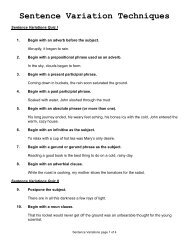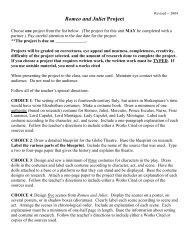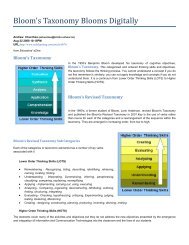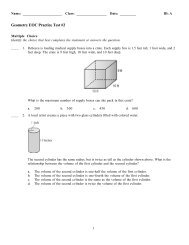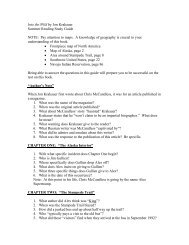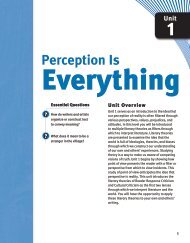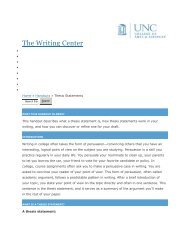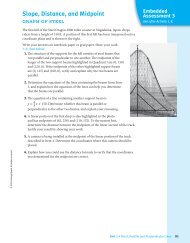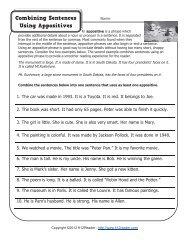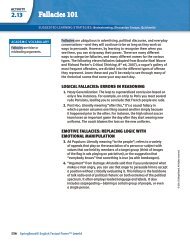Working Toward the Dream - Southwest High School
Working Toward the Dream - Southwest High School
Working Toward the Dream - Southwest High School
You also want an ePaper? Increase the reach of your titles
YUMPU automatically turns print PDFs into web optimized ePapers that Google loves.
Activity 1.12<br />
continued<br />
© 2011 College Board. All rights reserved.<br />
Japanese, some Chinese. At one time <strong>the</strong>y used us against each o<strong>the</strong>r. But now<br />
<strong>the</strong>y can’t and <strong>the</strong>y’re scared, <strong>the</strong> growers. They can organize conglomerates.<br />
Yet when we try organization to better our lives, <strong>the</strong>y are afraid. Suffering<br />
people never dreamed it could be different. Cesar Chavez tells <strong>the</strong>m this and<br />
<strong>the</strong>y grasp <strong>the</strong> idea — and this is what scares <strong>the</strong> growers.<br />
Now <strong>the</strong> machines are coming in. It takes skill to operate <strong>the</strong>m. But<br />
anybody can be taught. We feel migrant workers should be given <strong>the</strong> chance.<br />
They got one for grapes. They got one for lettuce. They have cotton machines<br />
that took jobs away from thousands of farm workers. The people wind up in<br />
<strong>the</strong> ghettos of <strong>the</strong> cities, <strong>the</strong>ir culture, <strong>the</strong>ir families, <strong>the</strong>ir unity destroyed.<br />
We’re trying to stipulate 6 it in our contract that <strong>the</strong> company will not use<br />
any machinery without <strong>the</strong> consent of <strong>the</strong> farm workers. So we can make<br />
sure <strong>the</strong> people being replaced by <strong>the</strong> machines will know how to operate <strong>the</strong><br />
machines.<br />
<strong>Working</strong> in <strong>the</strong> fields is not in itself a degrading job. It’s hard, but if you’re<br />
given regular hours, better pay, decent housing, unemployment, and medical<br />
compensation, pension plans — we have a very relaxed way of living. But<br />
growers don’t recognize us as persons. That’s <strong>the</strong> worst thing, <strong>the</strong> way <strong>the</strong>y<br />
treat you. Like we have no brains. Now we see <strong>the</strong>y have no brains. They have<br />
only a wallet in <strong>the</strong>ir head. The more you squeeze it <strong>the</strong> more <strong>the</strong>y cry out.<br />
If we had proper compensation we wouldn’t have to be working seventeen<br />
hours a day and following <strong>the</strong> crops. We could stay in one area and it would<br />
give us roots. Being a migrant, it tears <strong>the</strong> family apart. You get in debt. You<br />
leave <strong>the</strong> area penniless. The children are <strong>the</strong> ones hurt <strong>the</strong> most. They go to<br />
school three months in one place and <strong>the</strong>n on to ano<strong>the</strong>r. No sooner<br />
do <strong>the</strong>y make friends, <strong>the</strong>y are uprooted again. Right here, your<br />
childhood is taken away. So when <strong>the</strong>y grow up, <strong>the</strong>y’re looking<br />
for this childhood <strong>the</strong>y have lost.<br />
If people could see — in <strong>the</strong> winter, ice on <strong>the</strong> fields.<br />
We’d be on our knees all day long. We’d build fires and<br />
warm up real fast and go back onto <strong>the</strong> ice. We’d be<br />
picking watermelons in 105 degrees all day long. When<br />
people have melons or cucumber or carrots or lettuce,<br />
<strong>the</strong>y don’t know how <strong>the</strong>y got on <strong>the</strong>ir table and <strong>the</strong><br />
consequences to <strong>the</strong> people who picked it. If I had<br />
enough money, I would take busloads of people out<br />
to <strong>the</strong> fields and into <strong>the</strong> labor camps. Then <strong>the</strong>y’d<br />
know how that fine salad got on <strong>the</strong>ir table.<br />
Word<br />
Connections<br />
The Latin term quid pro<br />
quo means an equal<br />
exchange or substitution.<br />
For example, in a work<br />
situation, <strong>the</strong> employee<br />
receives wages, and <strong>the</strong><br />
employer receives <strong>the</strong><br />
work done. Whe<strong>the</strong>r <strong>the</strong><br />
two are of equal value<br />
is sometimes a point of<br />
dispute.<br />
My Notes<br />
6<br />
stipulate: to lay down a condition of an agreement<br />
Unit 1 • The American <strong>Dream</strong> 71





